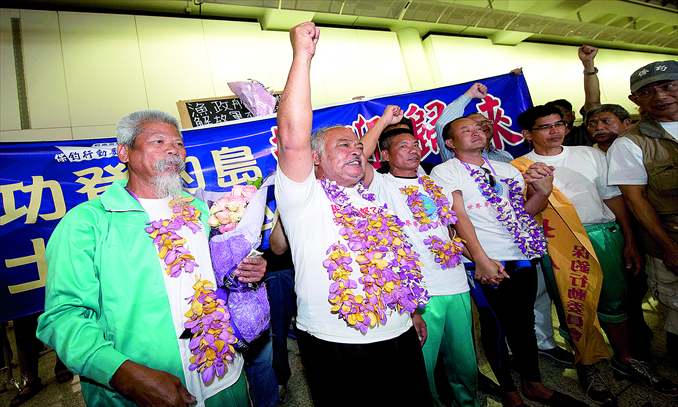Diaoyu activists return safely

Seven Chinese nationals detained by Japan after landing on the Diaoyu Islands returned to Hong Kong Friday evening, sparking a heated discussion on how to solve the Diaoyu Islands issue without harming Sino-Japanese relations.
The 14 people return to Hong Kong in two parties. Seven boarded a flight from Naha, Okinawa at 5:36 pm, arrived at 7:50 pm Hong Kong time.
Another seven will travel by the Kai Fung 2, the boat activists used to land on one of the Diaoyu Islands on Wednesday.
Ships from the Chinese mainland and Hong Kong will escort the vessel, according to a press release from China's Ministry of Foreign Affairs.
The activists told waiting journalists they were healthy and their boat was in good shape. They were expected to be escorted out of Japanese territorial waters by the coastguard, according to AFP.
"Japan detained 14 Chinese nationals on and around the Diaoyu Islands in a serious violation of China's territory. And it adopted dangerous actions during the interception of Chinese vessels. China strongly condemns and protests against Japan's action," Qin Gang, a Foreign Ministry spokesman, said on Friday.
Tong Zeng, a Chinese entrepreneur and president of the Chinese Civilian Association for Safeguarding the Diaoyu Islands, told the Global Times that it was really brave for the 14 to assert China's sovereignty on the Islands and that both China and Japan have worked out an acceptable way to solve the confrontation.
"That seven of them can leave Japan in their own vessel shows that we have the full right to freely passing and landing on the territory we own. And it has inspired so many people to join the league to fight for our sovereign rights and it's a good patriotic lesson to all Chinese," Tong said.
"The Prime Minister has received detailed reports on the illegal landing," said Japanese Chief Cabinet Secretary Osamu Fujimura, adding that the decision for deportation was approved by the Japanese Prime Minister Yoshihiko Noda on Thursday. He denied that the decision was made on grounds of political expediency, AFP reported.
However, Japanese nationalists bombarded Noda's decision and shouted at activists on their way to leave the country.
Tokyo Governor Shintaro Ishihara said at a press conference on Friday that the Japanese government has shown itself weak in the way it handled the landings. Ishihara stated that the landings were clearly illegal, and that just deporting the activists didn't show respect for the law, according to Kyodo News.
Japanese Embassy in China also released a statement warning Japanese nationals to be cautious of protestors in China.
"Japan is trying to make China sound threatening to Japanese. But we've never hurt a single Japanese during our protests and we are just claiming our own rights," Tong said, adding that they will pursue a less risky means of protest than landing on the islands.
Geng Xin, deputy director of the Tokyo-based Japan-China Communication Institute, told the Global Times that the Diaoyu Islands issues are special because of the historical disputes and that cross-Straits relations have also been improved by the claim to the islands.
"With Russian and South Korean leaders claiming their rights to territories disputed with Japan, the Japanese public has been inflamed for a nationalistic outbreak," Geng said, adding that the Chinese government should continue pushing reunification across the Taiwan Straits and actively reach a consensus with the US to properly solve the issues involved.
Da Zhigang, a professor of Japanese studies at the Heilongjiang Academy of Social Sciences, told the Global Times that China and Japan have entered a phase of confrontation and both countries need to work things out together for a better regional environment.
"As China has taken over Japan's place as the world's second largest economy, surveys have shown that public attitudes toward the other nation in both countries have reached the lowest point since the end of World War II," Da said.
The return of the activists showed that China has certain diplomatic influence and can handle the issues, but Japan need to work with China, since both nations rely on each other for economic development, Da said.